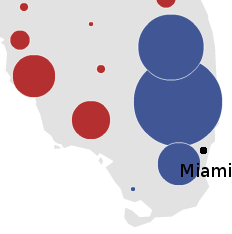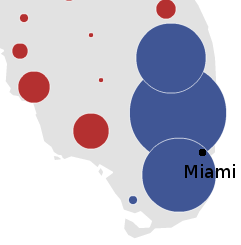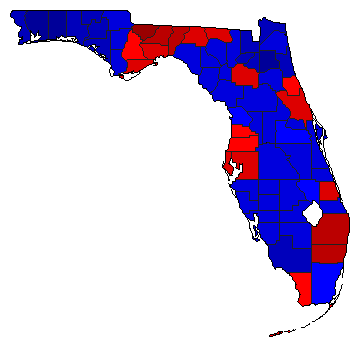This is the last part of an analysis on the swing state Florida. The previous parts can be found here.
Miami-Dade County
Here is how John Kerry did in south Florida:

Here is how Barack Obama performed:

There is no other place in Florida (and, perhaps, the country) like Miami-Dade. Palm Beach and Broward counties are retiree destinations; Miami is home to immigrants and refugees from all Latin America. More than 60% of the population is Latino – and only 3% of them come from Mexico. The Miami accent is unique compared with the nation. Local government is distinct from other counties in Florida.
More below.
One would expect Miami to be one of the most Democratic places in the nation, much like New York City or Chicago.
It is not.
Compare the two maps again. Broward and Palm Beach are marginally smaller, when compared to Obama’s performance. The big difference, however, is with Miami-Dade. Kerry won it by 6%; Obama won it by 16%.
Obama won the five boroughs of New York City by 59%: a 4 to 1 margin. He won Cook County (Chicago) by 53%, with more than three-fourths of the vote. In contrast, Obama took 58% of Miami-Dade county – less than the amount by which he won New York City. The 2008 Democratic performance in Miami is comparable to their performance in cities such as Dallas (57% of the vote) and Sacramento (58% of the vote).
Much of this is due to the Cuban vote, the city’s largest demographic group. Refugees from Castro’s Cuba, staunchly anti-Communist, and faithful Republicans ever since the Bay of Pigs fiasco; Cubans vote as strongly Republican as Jews vote Democratic. In 2000, George W. Bush won about four out of five Cubans, helped by Cuban anger over Al Gore’s role in the Elian Gonzalez affair. In 2008 Obama won around 35% of their vote, based on exit polls. This was the best performance of a Democrat with Cubans in recent memory.
Their influence ensures that Miami remains a competitive, Democratic-leaning city. Democrats usually end up winning it, but their margins are severely cut. And occasionally it will turn up in the Republican column – as happened during the 2004 Senate race. There, Mel Martinez, a Bush ally, won Miami-Dade on his way to a one percent victory.

(Edit: After reading some comments, I must note that in this map red means Democratic; blue means Republican. It’s taken from http://www.uselectionatlas.org/, whose coloring is odd.)
Democrats often hopefully comment that demographic shifts will slowly move Cubans leftward, as a new generation of Cubans, less concerned with Castro and communism, replaces their more militant elders. Perhaps. But that process will be the work of decades, not a single election cycle. For the moment the Cuban vote remains strongly Republican.
In 2008 the Democrats challenged two entrenched, Republican congressmen in south Florida: the Cuban Diaz-Balart brothers. The races were closely watched, so much that the New York Times Magazine aired an article dedicated to them. In the end, both Republicans won by margins larger than expected. Their continuing presence points to the steadfastness of the Cuban Republican vote.
Conclusion
Of the three most commonly cited swing states, Florida is the most conservative. The state can be divided into unique blocs, each of which has a distinct culture. The first, northern Florida, shares much/is part of the Deep South. Voting patterns reflect this. The populous I-4 corridor – Florida’s so-called swing-region – leans Republican, although Democrats perform well in Tampa Bay and Orlando. Finally, south Florida – diverse and populous – is the Democratic base, although the Cuban vote in Miami blunts their strength.
Whether Florida will remain this way is uncertain. Florida is an immense and diverse state. It is home to the Panhandle and Miami – two places opposite as night and day. Most every part of America can be found in the varied peoples that reside there. And certainly, it will continue to be an important swing state, sought after by both parties. Whoever ends up winning Florida is well on his or her way to becoming president.
2 comments